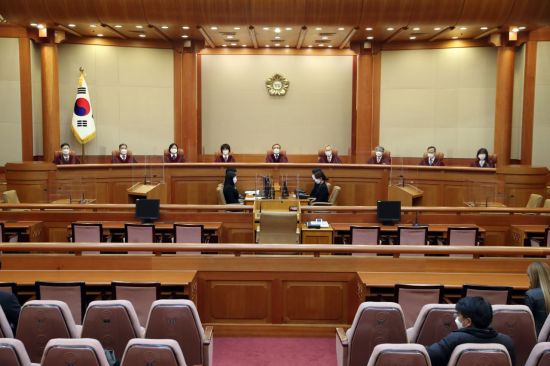
Constitutional Court Supreme Court decision. [이미지출처=연합뉴스]
[아시아경제 최석진 기자] The Constitutional Court decided that the so-called “culture and arts blacklist” and exclusion of support, which gave disadvantages, such as the Park Geun-hye administration making a list of cultural artists with specific political orientations, and excluding them from government support was unconstitutional exercise of public power.
On the 23rd, artistic director Yoon-taek Lee, Yeonhui Short Street Plaque, Seoul Theater Association, etc., who were blacklisted during the Park Geun-hye administration on the 23rd, created and executed a list of exclusions from support in the culture and arts world, the so-called “blacklist in the culture and art world”. In the case of a constitutional complaint filed against former President Park Geun-hye and former secretary chief Kim Ki-chun, alleging that the freedom of art and the right to equality were violated, the judges decided to confirm the unconstitution with the unified opinion of all the judges.
The Constitution said, “Restrictions based on specific opinions or ideologies are the most serious and harmful restrictions on the freedom of expression,” he said. “It is contrary to the fundamental principles of the Constitution, the basic principle of national sovereignty and liberal democracy.”
In the case of the’Cultural Arts Blacklist’, the Park Geun-hye administration collected and retained information on political propensities such as whether cultural artists participated in the declaration of support for specific politicians, and whether or not they participated in the declaration calling for the abolition of the Enforcement Decree of the Sewol ferry. It’s the case.
This suspicion was specifically confirmed through the contents of a complaint indicted by a special prosecutor Park Young-soo, who investigated the case of Gukjeong Nongdan, indicting former secretary chief Kim.
After the election of former President Park, Chief Executive Kim instructed to take penal measures for cultural artists who had political tendencies against the regime or had a history of expressing such political expressions, and at that time, head of government, etc., established a database to exclude support. It turned out that they managed and delivered the’black list’ to the officials of the Ministry of Culture, Sports and Tourism.
Accordingly, the blacklisted cultural artists such as Lee said that in April 2017, “declaring support for the opposition party or excluding them from government support for making works on specific issues such as the’Sewol ferry disaster’, freedom of expression and art It violates,” and filed a constitutional complaint.
The Constitution pointed out that the government’s collection, possession, and use of information on individual political views is a’significant limit’ on the right to make decisions about personal information, so the blacklist was made without a legal basis.
In addition, as the act of collecting information was for an unconstitutional order to block support to artists who are critical of the government, it was judged that it was an exercise of public power that could not be permitted under the constitution.
Based on political views, it was judged that the exclusion of certain artists from government-sponsored projects also violated the right to equality, saying that it was’arbitrary discrimination’.
An official from the Constitutional Constitution expressed the significance of this decision, saying, “All of the information collection acts and the order to exclude support should be canceled, but as all were ended, we have confirmed the constitution in a declarative sense to prevent repeated infringement of similar fundamental rights.
Reporter Choi Seok-jin [email protected]
